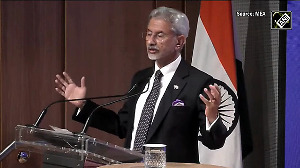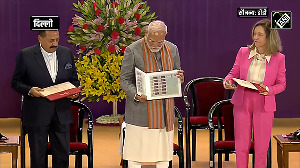'When it is unpaid, sometimes, they don't take you seriously.'
'Work is not reviewed, and there is no effort in making interns learn.'

When Siya Malik (name changed on request) was in her final years of schooling in 2021, she actively started looking for internships in the content field.
Her weeks-long hunt ended with a well-known student-led organisation, which simulates the workings of Parliament and multilateral organisations, offering internships for content writing, but without a stipend.
Malik, who is now pursuing her bachelor's in arts, says, "I was a fresher and wasn't expecting a stipend, but the work was 24/7."
She worked with the organisation for nearly two years during which her seniors "suggested" to her to pursue open college so that she can devote more time.
Her work included making three-four study guides every week, each of at least 15 pages.
"Even though I got promotions, nothing was mentioned in the certificate that I received at the end of the internship," she adds.
Malik's story is of many who seek internships in the absence of a formal structure.
The challenge is more in fields like content writing, social media management, graphic designing, etc. that attract maximum fresher interest.
"In 2023 alone, 36 per cent of the internships posted on Internshala were from fields beyond management and engineering. These included media, design, education, finance, data science, social work, and volunteering, among others," says Sarvesh Agrawal, founder and DEO, Internshala.
Sakshi Bansal, a 24 year old from New Delhi, who completed an unpaid social media marketing internship with a non-profit organization in 2022 and then a few paid projects, highlights the difference between the two.
"When it is unpaid, sometimes, they don't take you seriously. Work is not reviewed, and there is no effort in making interns learn," Bansal says, adding that her next internships didn't pay much, but a little stipend made things more organised.
According to the data shared by Internshala, from July 2023 to July 2024, the average monthly pay in content writing was Rs 5,000 even though the highest monthly stipend offered was nearly Rs 50,000.
For other fields like social media marketing, graphic designing, social work, and video editing, the highest pay was between Rs 30,000 and Rs 50,000.
However, the average monthly pay was below Rs 7,000 for all these fields.

Experts highlight that since the internship industry is unregulated in the absence of a legal framework, it is difficult to set stipend limits for interns in India.
Internships remain an unregulated sector not covered under either the Industrial Employment Act 1946 or the Minimum Wages Act 1948.
Khushi Wahi, former president of the Internship and placement cell at a Delhi University college, turns the spotlight on the fresher intern hiring challenges.
"There is a huge communication gap. Multinational companies tend to hire either post-graduates or students from prestigious colleges," says Wahi.
"Undergraduates from Tier-II and Tier-III colleges are either offered unpaid internships or positions that require less technical skills with little to no exposure," Wahi explains.
"More technical the field and a decent company mean higher chances of an unpaid internship. It is a 'trade-off' for exposure. In case of paid internship, the average pay ranges between Rs 7,000 and Rs 10,000, depending upon the position being offered and the company," Wahi adds.
Career platform Internshala saw over 150,000 openings for internships in the content writing field during July 2023 to July 2024.
It was followed by graphic designing with over 35,000 openings and video editing over 25,000 opportunities.
During the Union Budget 2024-2025 speech, Finance Minister Nirmala Sitharaman announced an ambitious youth internship programme.
Under the first phase, internships will be offered to three million youths over two years, with an allocated budget of Rs 19,000 crore (Rs 190 billion).
Each intern will be eligible for a monthly stipend of Rs 5,000. She further added that the internships will be provided in the top 500 companies. However, the speech did not specify further details about the project.

Fields like law, engineering, and medicine often mandate internships before actual jobs, which are mostly unpaid due to insufficient opportunities.
Take the example of Tanisha Sharma (name changed on request), a recent engineering graduate from a New Delhi-based top private engineering college, who is now working with IT major Wipro as an unpaid Cloud Computing intern before she becomes eligible for a job.
"No stipend is a challenge, but the learning is good. We are given workshops and mentors are provided," says Sharma.
"The structure of internships varies across fields, industries, and organizational types. Traditional fields like sales or tech tend to have more structured internships," says Sashi Kumar, head of sales, Indeed India.
Chandigarh-based final year law student Ritika Munjal, who worked as an intern with a top litigation firm and then a corporate law firm, brings into focus the structural difference between the two.
"I joined a top litigation firm but for the first nine months, it was unpaid, and then a stipend of Rs 5,000 was provided," Munjal says, adding that in litigation, even junior lawyers are paid very less, sometimes not even as much as their basic payroll.
"However, in corporate firms, you are offered a stipend along with other perks and benefits from the first day," Munjal says, adding her first stipend at a corporate firm was Rs 11,000.
Advocate Navneet Chugh, managing partner, Chugh LLP, and a face of multiple lawyer associations globally, including International Indian Bar Association and Indian Lawyers' Association, highlights the challenges, especially for the first-generation lawyers.
"Despite the variety of opportunities -- government bodies, law firms, NGOs, and corporate legal departments -- first-generation lawyers often face difficulties due to a lack of established networks and guidance," Chugh says.
Apart from standardised guidelines for admissions, Chugh emphasises on financial support for those who can't afford unpaid internships.
"Also, they need to establish a regulatory body to oversee and ensure the quality and compliance of internship programmes with legal and ethical standards," he adds.
Unlike medicine, where colleges and hospitals offer internships internally in most cases, students from the fields of media and law are left to the vagaries of the job market.
Internshala saw less than 700 medicine openings last year as compared to over 8,000 in the legal field. However, compared to the demand, the 8,000 legal openings simply pale into insignificance.
"This imbalance (of demand and supply) can result in students struggling to secure meaningful internships, often resorting to positions that may not offer substantial learning or professional growth," Chugh notes.
Feature Presentation: Ashish Narsale/Rediff.com












 © 2025
© 2025